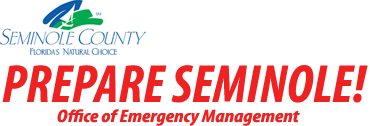SEMINOLE COUNTY BURN BAN EFFECTIVE IMMEDIATELY. LEARN MORE.
Get a Kit
Pet Disaster Kit
The primary objectives of pet first aid are to relieve suffering, to save life, and to prevent further physical and/or psychological injuries until your pet can be checked by a qualified veterinarian.
If you don't want to prepare your own kits, there are very good prepackaged kits on the market. Examine their contents carefully so that you know whether or not the kit is appropriate, as there are also kits which are nothing more than "band aids".
Important Documents
- Medical and vaccination records
- Current photos of pet with the owner
- Information on feeding schedule
- Recorded behavioral issues
- AKC and other important ownership papers
- Important telephone numbers (including veterinarian's)
Food/Water
- Water
- Pet food
- Dog/Cat Treats
- Feeding bowls
First-Aid Kit
- Adhesive tape to secure bandages
- Instant hot and cold compresses
- Blunt tipped scissors
- Alcohol swabs to sterilize instruments or small areas of skin
- Antibiotic ointment for wounds (not for eyes) (ie. Betadine ointment, Bacitracin, Neosporin (for non puncture type wounds)
- Contact lens solution for rinsing eyes, to clean wounds (water can be substituted)
- Cotton swabs (ie. Q-Tips)
- Green soap — a mild antibacterial soap for cleaning skin, wounds
- Hydrogen Peroxide — 10 ml every 15 minutes to induce vomiting in animals that have ingested a non-caustic poison
- Stockingette to protect bandage on leg or foot
- Rubber bulb ear syringe — used for flushing eyes, ears, wounds
- Rectal Thermometer
- Self-adhesive bandage (ie. Vetrap)
- Numbers for the Animal Poison Hotline & Poison Control for Pets (800-548-2423 or 900-680-0000; both numbers charge a fee)
Medications
- Heartworm
- Flea/Tick spray
- Other medication as required
Tools and General Supplies
- Dog & cat crate or cage for smaller animals
- Litter pans
- Disposable bags
- Sturdy leashes
- Collars with owner information
- Toys
- Pet bed

